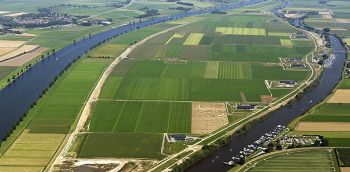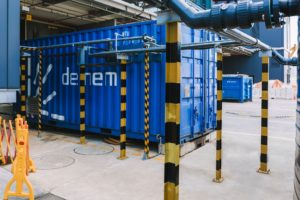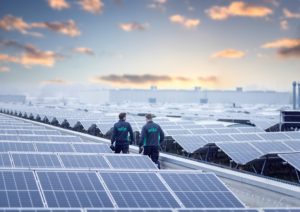BBA Pump Deliver Four Mobile Pump Systems for Project in the Netherlands
The Netherlands is located in the delta of three major European rivers. Water related issues such as flooding are always a risk. After a serious warning in 1995, when 250,000 people had to be evacuated due to a dangerously high water level, the national program ‘Room for the River’ came about.

2016 Overdiepse Polder completed (Image: BBA Pumps)
A safer river area as well as an attractive living environment. With these objectives in mind, more than 30 water storage facilities have been installed in the Netherlands to handle excess river water when water levels are high. Remarkable in this is the Overdiepse Polder, where a unique project to create raised islands – or terps – was undertaken.
The Overdiepse Polder water storage area
When water levels of the River Bergsche Maas are extremely high, this poses a threat to cities such as Den Bosch and Waalwijk. A storage area of 550 hectares named Overdiepse Polder accommodates nine million m3 of water as a temporary storage. Together with the agricultural residents, a ‘terp plan’ was developed so that the residents can live safely in the water storage area, even when water levels are high.
In 2011, construction began on a new six-kilometre long high dike on the southern end of the polder. Eight terps with new farms were built against the new dike, so the farmers now have a safe place to live. Each terp is approximately two hectares in size, six meters high and has a volume of 120,000 cubic metres of sand and clay.
In 2014, the old farms were ready to be demolished, and the works began to lower the river dike on the north end and to place a pumping station. A year later, a new lock could be commissioned - including a large setup location for mobile flood control pumps.
The project was completed following a European tender to deliver four mobile pump systems. In the middle of last year, BBA Pumps BV was officially awarded the contract and delivery took place in early March 2018.
Dry again after six weeks
On average, river water flows into the polder once every twenty-five years. This lowers the water level by 27 centimetres. This means that the local residents of villages and towns remain protected against upstream flooding. In conjunction with the other ‘Room for the River’ projects, this enhances the safety of over four million people within the river area.
When the polder is flooded and the farmers need to keep their livestock inside, the area must be dry again within six weeks of the flooding. As soon as the river s water level starts to drop, the lock is opened enabling some of the water in the polder to flow back. Once the water levels are equal, the lock is closed again. Subsequently, four mobile emergency pumps with a total pump capacity of 20,000 m3/hour are installed at the setup location. This is how the polder s excess water is pumped back into the river. Finally, the remaining water is drained through a pumping station in the river dike, and the polder is ready again for agricultural use.
The mobile pumping systems
The mobile pumping systems are managed by the Brabant Delta Water Board. In times of flooding, speed is of the essence; that has been a central condition when the set of tender requirements were drafted. The diesel-driven pumps are equipped with a ‘pull-up frame’ so their vehicles can quickly collect them from the storage and deliver them into the polder. Where possible, the pipework is equipped with quick action couplings so no time is lost during installation. After two weeks of pumping, over five million cubic metres of water will have been removed from the polder.
Exciting times
“It was quite exciting at times,” that’s what Simon Hofstra, project manager, had to say about the development and construction of Overdiepse Polder. “Not just for the residents, who have lived in extensive building works for years, but also for the contractor, because in the summer of 2014, he unexpectedly came across thousands of explosives from the Second World War! All the same, we are extremely proud of this project as we stayed within both budget and planning.”
During construction of the polder as well as during the pumps site acceptance test, interest was high, from both the Netherlands and internationally in this unique, typically Dutch project.
Source: BBA Pumps BV







